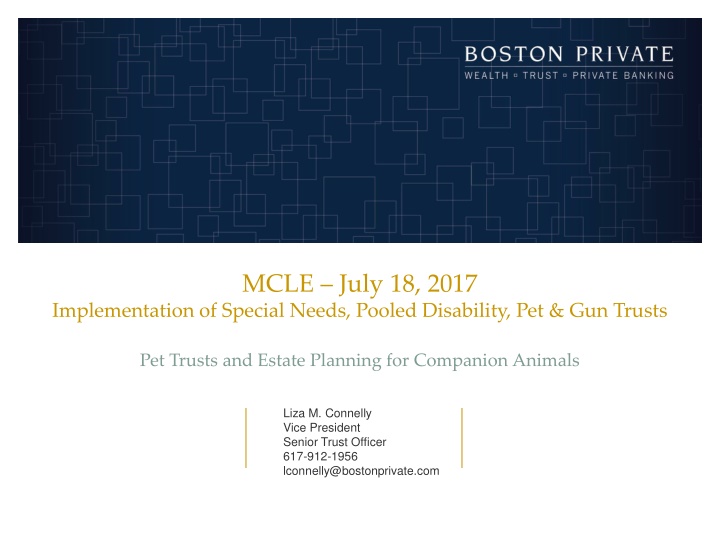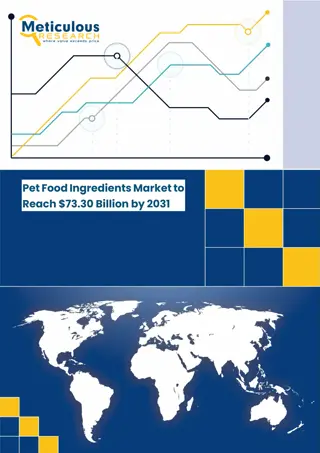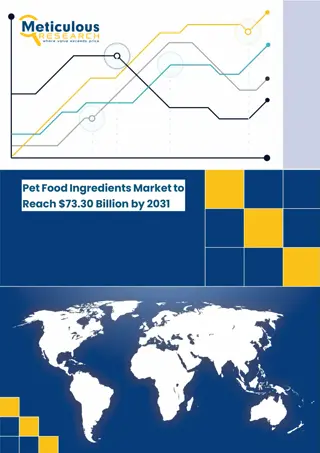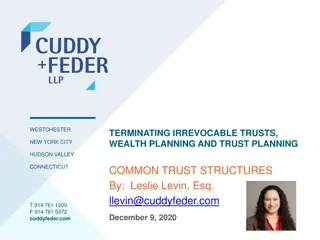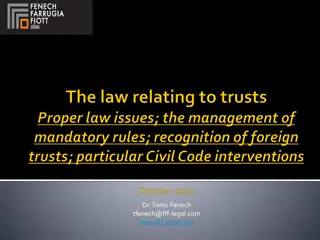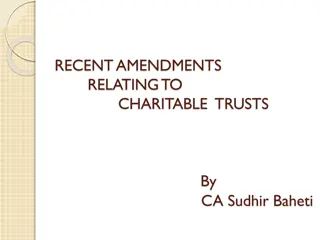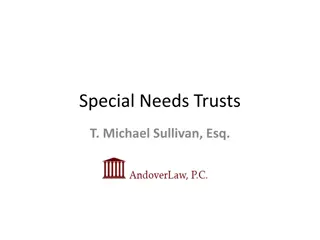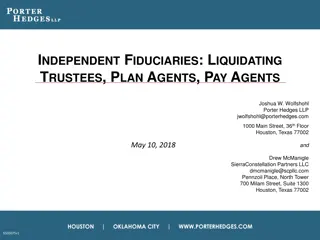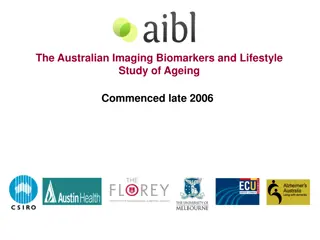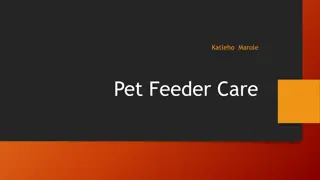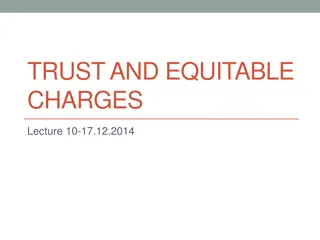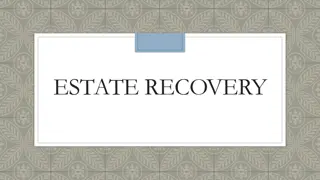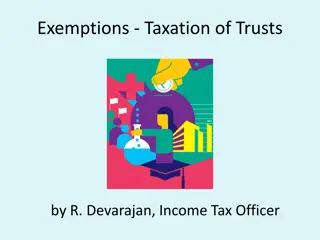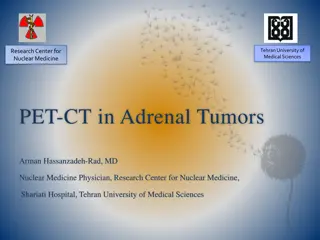Pet Trusts and Estate Planning: Implementation Insights
Explore the implementation of special needs, pooled disability, pet, and gun trusts, along with estate planning for companion animals. Learn about Massachusetts pet trust law history, comparisons with the Uniform Trust Code, roles of attorneys and trustees, federal legislation, and public policy considerations. Delve into controversies involving celebrities like Leona Helmsley and insights on pet trusts across the U.S.
Download Presentation

Please find below an Image/Link to download the presentation.
The content on the website is provided AS IS for your information and personal use only. It may not be sold, licensed, or shared on other websites without obtaining consent from the author.If you encounter any issues during the download, it is possible that the publisher has removed the file from their server.
You are allowed to download the files provided on this website for personal or commercial use, subject to the condition that they are used lawfully. All files are the property of their respective owners.
The content on the website is provided AS IS for your information and personal use only. It may not be sold, licensed, or shared on other websites without obtaining consent from the author.
E N D
Presentation Transcript
MCLE July 18, 2017 Implementation of Special Needs, Pooled Disability, Pet & Gun Trusts Pet Trusts and Estate Planning for Companion Animals Liza M. Connelly Vice President Senior Trust Officer 617-912-1956 lconnelly@bostonprivate.com
Table of Contents Prelude: Controversies and Celebrities Brief Overview of Pet Trusts Around the Country Massachusetts Pet Trust Law History Massachusetts Uniform Trust Code Section 408 Comparison of Mass Pet Trust Statute and MUTC Section 408 Guidance for Attorneys Guidance for Trustees Estate Planning for Pets Non-Trust Options Federal Legislation Public Policy Considerations References Disclosure page 2
Prelude: Controversies and Celebrities Celebrities and other famous people who have caused the issue to reach the spotlight: Leona Helmsley and her bequest of $12 million dollars to her dog, Trouble. - The bequest was later reduced to $2 million. Oprah Winfrey and Betty White are alleged to have made plans to ensure that their pets live out their lives in luxury. Other heiresses such as Doris Duke have left large sums for the benefit of their companion animals. page 3
Brief Overview of Pet Trusts Around the Country As of 2016, all 50 states and the District of Columbia have enacted pet trust statutes. Minnesota was the last state to pass pet trust legislation. 27 states, including Massachusetts, and the District of Columbia have enacted their statutes based on the pet trust provisions in the UTC: Alabama, Arizona, Arkansas, Florida, Georgia, Kansas, Kentucky, Maine, Maryland, Massachusetts, Minnesota, Mississippi, Missouri, Nebraska, New Hampshire, New Mexico, North Dakota, Ohio, Oregon, Pennsylvania, South Carolina, Tennessee, Vermont, Virginia, West Virginia, Wisconsin, Wyoming. 8 states enacted their statutes based on the UPC Section 2-907: Alaska, Colorado, Hawaii, Illinois, Michigan, North Carolina, South Dakota and Utah (Note that Massachusetts did not include Section 2-907 in the state s enacted version of the UPC). The remaining 15 have enacted unique legislation, meaning that the states have chosen to enact a stand-alone pet trust provision, although most have incorporated terms and provisions based on either the UTC, the UPC, or both: California, Connecticut, Delaware, Idaho, Indiana, Iowa, Louisiana, Montana, Nevada, New Jersey, New York, Oklahoma, Rhode Island, Texas, and Washington. page 4
Massachusetts Pet Trust Law History H. 1467 was enacted on January 7, 2011, effective as of April 7, 2011, as M.G.L. chapter 203 Section 3C, and was incorporated into the Massachusetts Uniform Trust Code as Section 408 as of July 2012. As passed, the Pet Trust Statute contained the following terms: Section 1. Not withstanding any general or special law or regulation to the contrary, Chapter 203 of the General Laws, as appearing in the 2006 Official Edition, is hereby amended by inserting after section 3B the following section: Section 3C. A trust for the care or one or more animals alive during the settlor s lifetime is valid. Unless the trust instrument provides for an earlier termination, the trust terminates upon the death of the animal or, if the trust was created to provide for the care of more than one animal alive during the settlor s lifetime, upon the death of the last surviving animal. (a) Except as expressly provided otherwise in the trust instrument, no portion of the principal or income may be converted to the use of the trustee, other than reasonable trustee fees and expenses of administration, or to any use other than for the benefit of a covered animal or animals. (b) A court may reduce the amount of property held by the trust if that amount substantially exceeds the amount required for the intended use and the court finds that there will be no substantial adverse impact in the care, maintenance, health or appearance of the animal or animals. The amount of the reduction shall pass as unexpended trust property in accordance with paragraph (c) of this Section. page 5
Massachusetts Pet Trust Law History Section 3C,continued, (c) Upon reduction or termination, the trustee shall transfer the unexpended trust property in the following order: (1) As directed in the trust instrument; (2) To the Settlor, if living; (3) If the trust was created in a nonresiduary clause in the transferor s will or in a codicil to the transferor s will, under the residuary clause in the transferor s will; or (4) To the settlor s heirs in accordance with G.L. c. 190. (d) If a trustee is not designated by the trust instrument or no designated trustee is willing or able to serve, the court shall name a trustee. The court may order the transfer of the property to another trustee if the transfer is necessary to ensure that the intended use is carried out. The court may also make other orders and determinations as are advisable to carry out the intent of the settlor and the intended use of the trust. (e) The intended use of the principal or income may be enforced by an individual designated for that purpose in the trust instrument, by the person having custody of an animal for which care is provided by the trust instrument, by a remainder beneficiary, or by an individual appointed by a court upon application to it by an individual or charitable organization. (f) The settlor or other custodian of an animal for whose benefit the trust was created may transfer custody of the animal to the trustee at or subsequent to the creation of the trust. (g) Any trust created under this Section shall be exempt from G.L. c. 184A and the common law Rule Against Perpetuities. page 6
Massachusetts Uniform Trust Code Section 408 Trust For Care Of An Animal (a) A trust for the care of animals alive during the settlor s lifetime shall be valid. Unless the trust instrument provides for an earlier termination, the trust shall terminate on the death of the animal or, if the trust was created to provide for the care of more than one animal alive during the settlor s lifetime, upon the death of the last surviving animal. (b) Except as otherwise expressly provided in the trust instrument, no portion of the principal or income shall be converted to the use of the trustee, other than reasonable trustee fees and expenses of administration, or to any use other than for the benefit of the covered animals. (c) A court may reduce the amount of the property held by the trust if it determines that the amount substantially exceeds the amount required for the intended use and the court finds that there will be no substantial adverse impact in the care, maintenance, health or appearance of the covered animal. The amount of the reduction shall pass as unexpended trust property in accordance with subsection (d). (d) Upon reduction or termination, the trustee shall transfer the unexpended trust property in the following order: - (1) As directed in the trust instrument; - (2) to the settlor, if living; - (3) if the trust as created in a nonresiduary clause in the transferor s will or in a codicil to the transferor s will, under the residuary clause in the transferor s will or codicil; or - (4) to the settlor s heirs in accordance with chapter 190B (Massachusetts Uniform Probate Code). page 7
Massachusetts Uniform Trust Code Section 408 Trust For Care Of An Animal, continued (e) If a trustee is not designated by the trust instrument or no designated trustee is willing or able to serve, the court shall name a trustee. The court may order the transfer of the property to another trustee if the transfer is necessary to ensure that the intended use is carried out. The court may also make other orders and determinations as the court deems advisable to carry out the intent of the settlor and the intended use of the trust. (f) The intended use of the principal or income may be enforced by an individual designated for that purpose in the trust instrument, by the person having custody of an animal for which care is provided by the trust instrument, by a remainder beneficiary or by an individual appointed by the court upon application of an individual or charitable organization. (g) The settlor or other custodian of an animal for whose benefit a trust was created may transfer custody of the animal to the trustee at or subsequent to the creation of the trust. (h) Any trust created under this section shall be subject to sections 2-901 to 2-906 (statutory rule against perpetuities), inclusive, of chapter 190B, and the common law rule against perpetuities; provided, however, that the life or lives in being shall be measured based on the animal or animals alive at the time of the settlor s death or when the trust becomes irrevocable. The measuring lives shall be those of the beneficiary animals, not human lives. page 8
Comparison of Pet Trust Statute to MUTC 408 The terms are the same, except for the addition of the language which now applies the Rule Against Perpetuities to pet trusts. The statutory pet trust had specifically excluded pet trusts from the Rule Against Perpetuities. The pet trust statute as included in the MUTC 408 now includes it. The MUTC s incorporation of the pet trust statute and repeal of the statute as a stand-alone provision ensured that there are no gaps, no conflicts, and no overlaps between the MUTC and the pet trust statute. page 9
Guidance for Attorneys Drafting Considerations Be sure to clearly identify the animals to be included in the trust. - Recommendation would be to name animals in existence and any that the donor has at the time of death. - Work with the client to ensure the animals can be clearly identified by the trustees, family members and other parties such as veterinarian. - Example: The Hahn v. Estate of Stange case (Texas Court of Appeals, 4th District, Delivered and Filed February 13, 2008 No. 04-07-00253-CV). The trust failed not because animals were named as beneficiaries but because the trust did not clearly identify the animals the court ruled that all my cats was too vague and the caretaker could not identify the animals. When and Where to Make Bequests for Funding In Will with direction to fund separate, stand-alone pet trust. In Revocable Trust with direction to fund separate, stand-alone pet trust. - Do not include / mix with human beneficiaries, such as surviving spouse, children, etc. How Much to Fund Pet Trust Factors to Consider How many animals does the Testator/Donor own or envision owning? What types of animals are they? What is their expectancy and what are the current costs for food, housing, veterinarian care and other costs? page 10
Guidance for Attorneys Structure of Trust Checks and Balances Planning for beneficiaries who cannot speak for themselves.. Trustee has legal title of the animals. Caregiver has custody and provides daily care. Third parties such as veterinarians and animal welfare groups have standing, as permitted by MUTC, to seek the court s assistance in enforcement of the trust, welfare and care of the animals, and removal and replacement of the Trustee, if necessary. Tax Considerations of Pet Trust Revocable Trust will be taxed to donor while alive. Irrevocable Trust draft as a Grantor Trust so donor will pay income taxes while alive. Irrevocable Trust - Taxed to the Trust at Donor s death. - Recommend minimizing tax consequences by funding with cash or tax-exempt assets to minimize income tax burden. - May cause income tax liability to caregiver / custodian if receiving cash/funds from trust; recommendation is to make as many payments to pet care providers as possible. Note IRS will not allow Pet Trust for benefit of animals while they are alive and remainder to charity to be treated as charitable remainder trust for income tax purposes because only a person can be used for measuring lives, and an animal is not a person as defined by IRC Section 7701(a)(1). page 11
Guidance for Trustees Ensuring Adequate Care Have the companion animal or animals clearly identified before the decedent passes away. Consider harmless tattooing or microchipping of the animal. Conduct surprise visits from the Trustee or party interested in the animal s welfare to ensure that the right animal is still alive and being taken care of properly. Anecdote of the black cat case: Case involved a maid who was to receive a certain income amount for as long as the decedent s cat was alive and the maid took care of the cat. It was later determined that the original cat died and the maid just continued to replace the original cat with subsequent black cats until the trustee caught on. page 12
Estate Planning for Pets Non-trust Options Wills and Codicils By law, animals are property, and therefore can be distributed through a Will. Testator can bequeath companion animal or animals to a person or persons. Testator can also provide specific bequest of certain amount of money or other assets to help defray cost of continued care of animals for remainder of their lives. Testator can include precatory language for requested care of animals but the terms cannot be enforced. Benefits better than no plan at all; usually if friends or family members are selected, they will have some sense of duty, obligation to carry out testator s wishes. Risks no means of enforcement, once bequest is made, the recipients can do whatever they wish with both the animals and the assets received. There is no guarantee that the persons selected will continue to care for the animals or even keep them. page 13
Estate Planning for Pets Non-trust Options Wills and Codicils Sample language I leave my cats, Milo and Olivia, and any other companion animals I may own at the time of my death to my sister-in-law Julie Connelly, with the request that she care for them for the remainder of their lives. If Julie is unable or unwilling to accept such animals, my Personal Representative shall be given to the MSPCA Boston shelter, with the request that they be placed in a new home together and not separated. I leave my dog, Greta, to my friend Amy Kopfler, along with the sum of $30,000 for the continued care of Greta for the remainder of her life, including but not limited to food, shelter, all veterinary costs, annual check-ups and vaccines, grooming and any kennel charges. I direct my Personal Representative to pay, as an administrative expense, all costs, expenses associated with the care, feeding and any veterinary costs, of my cats, Ben and Jerry, and any other animals I may own at the time of my death, until the animals are placed with the persons that I have selected to care for the animals for the duration of their lives, regardless of whether or not these expenses are deductible for estate tax purposes. page 14
Estate Planning for Pets Non-trust options Durable Power of Attorney Can provide for care of companion animals during incapacity. Language can include the following provisions: - Powers regarding daily needs food, medications, exercise. My attorney-in-fact may do all that is necessary or required for the daily care and maintenance of health of my companion animals. Powers regarding medical care authorizing any veterinary care, either maintenance or emergency / urgent needs. My attorney-in-fact approve and authorize any and all medical treatment deemed necessary by a duly-licensed veterinarian and may execute any consent, release or waiver of liability by the veterinarian relating to the medical, surgical or other essential treatment and care of my companion animals by a qualified veterinarian. - Power in the event of the death of a companion animal while principal is incapacitated what to do with remains. If any of my companion animals should die while I am incapacitated, My attorney-in-fact may direct the disposition of the remains as I would wish (request ashes, burial). - Power to locate temporary homes for companion animals if principal will be incapacitated for extended period of time. My attorney-in-fact may place my companion animals with my family members or friends who are willing and able to care for the animals until I am again able to do so. - page 15
Estate Planning for Pets Non-trust Options Other Suggestions for Ensuring Care of Companion Animals Stickers in windows Pet ID card in wallet, purse, briefcase Lists of medications, food, veterinarian in easy-to-find location within house Pet carriers in central location File with vaccines, annual check-ups, rabies tags, pet care insurance information page 16
Federal Legislation The Morgan Bill Introduced by Representative Earl Blumenauer of Oregon, first in 1999 and again in 2001 Congress. Named for Representative Blumenauer s Collie, Morgan, the bill would allow a pet trust with a charitable remainder to qualify for estate tax deductions. The Humanity And Pets Partnered through the Years Act a.k.a. HAPPY Act Introduced by Rep. Thaddeus McCotter of Michigan with co-sponsors Rep Steve Cohen of Tennessee and Rep Jared Polis of Colorado and endorsed by many national animal welfare organizations. The act would allow pet owners to deduct up to $3,500 of pet-related expenses from their Federal taxable income for income tax purposes. To date, neither bill has been enacted. page 17
Public Policy Considerations More and more people view their pets as family members and are concerned about the welfare of these animals if the animals should outlive them. The increase in veterinary advances now available to companion animals and the advent of pet health insurance for owners to minimize or reduce costs has added to the overall health and lifespan of people s pets. It has been estimated that between 12 and 27% of pet owners include their pets in estate planning. The American Veterinary Medical Association estimates that over 68.7 million households care for a companion animal. In Massachusetts, it is estimated that 33.3% of households live with a cat or dog. Municipal shelters and animal rescue organizations find that the incapacity or death of an owner results in abandonment, surrender or the inability to care for the pet. A Pet Trust statute in Massachusetts allows pet owners to provide financial resources for the care of their animals in the event of incapacity or death. Additionally, the burden placed on municipal shelters and rescue organizations will hopefully be eased as pet owners now have a viable, enforceable alternative plan for the care of their animals. page 18
References The following sources were used in compiling the information contained in this presentation: The Uniform Trust Code The Uniform Probate Code Individual state pet statutes Federal and Massachusetts proposed and enacted legislation The website of Professor Gerry W. Beyer of Texas Tech University School of Law http://www.ProfessorBeyer.com page 19
Disclosure Private Banking and Trust services are offered through Boston Private Bank & Trust Company, a Massachusetts Chartered Trust Company. Wealth Management services are offered through Boston Private Wealth LLC, a U.S. Securities and Exchange Commission Registered Investment Adviser. Boston Private Wealth LLC is a wholly owned subsidiary of Boston Private Bank & Trust Company. Boston Private Bank & Trust Company, its parent, its subsidiaries, and their staff, do not provide tax, accounting or legal advice. You should consult with your legal or tax advisor prior to taking any action relating to the subject matter contained on this website. Investments are not insured by the FDIC or any other government agency, are not guaranteed by Boston Private Bank & Trust Company or its subsidiaries, affiliates or parent company, may lose value, and are not a Bank deposit. The information and materials contained on this site or in any communication containing a link to this site is not intended for distribution to, or use by, any person or entity in any jurisdiction or country where such distribution would contrary to law or regulation or which would subject Boston Private Bank & Trust Company or its subsidiaries or affiliates to any registration requirement within such jurisdiction or country. The information and materials contained on this Site are not intended as an offer or solicitation for the purchase of stock, any other security or any financial instrument of Boston Private Bank & Trust Company or any other issuer or company. page 20
In Memory of Ben and Jerry And in Honor of Milo and Olivia page 21
